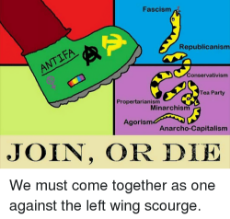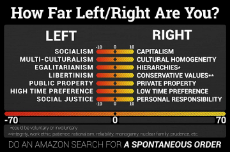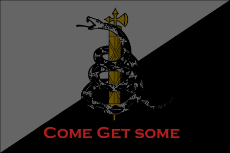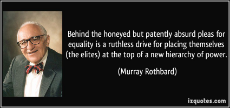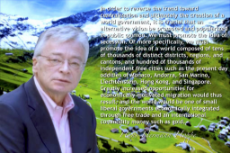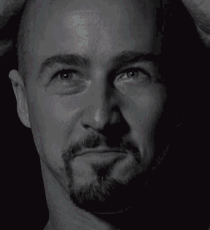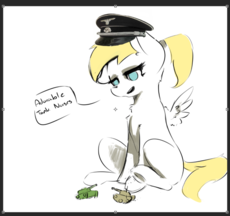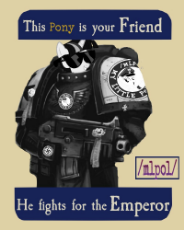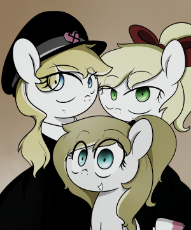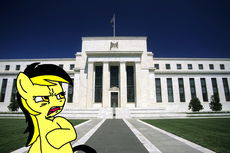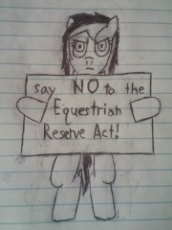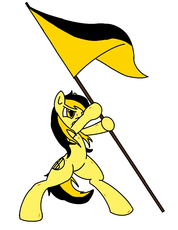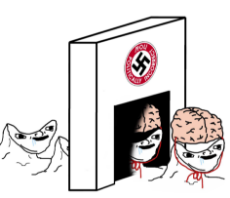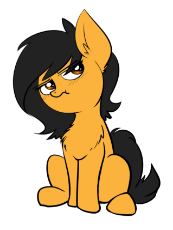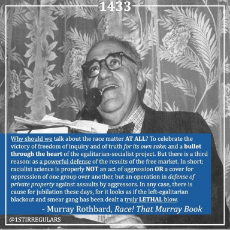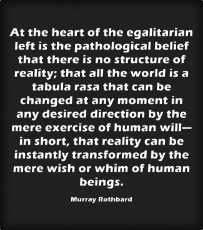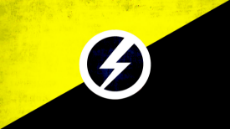Sources: https://www.youtube.com/watch?v=TICdCM4j7x8
https://radicalcapitalist.org/2017/11/08/for-a-libertarian-alt-right/
https://www.youtube.com/watch?v=XNmnZGegaeE
https://www.youtube.com/watch?v=Yg9cmYHUU0Y
Overview
We are in a war: a philosophical, cultural, religious war with the Left. We, the opponents of both leftists and milquetoasts on the right, can be classified as the Alt-Right. One of the parent ideologies of the movement (for there are many parents), which has also been criticizing and fighting the globalists for decades, is libertarianism. Libertarianism, the political-economic ideology that seeks to minimize or outright abolish the monopoly of force known as “government,” appears to be highly divergent from the tradition and hierarchy-oriented Alt-Right. Yet the opposite is true and, with more political discord inbound, it’s worth examining a more comprehensive and permanent union.
If one looks at the “membership” of both libertarianism and the Alt-Right (I put membership in quotes because there is no formal list of adherents for either) they are both heavily divided. A bulk of libertarians are the rugged, self-reliant sort, simply desiring less interference in life, while others are theorists who conceive a better society based entirely on property rights. Still others, a worrying percentage, are “lolbertarians:” people focused more on social justice than on economics, who by opposing borders and white identity are lite-AnCom. The Alt-Right is even more varied. Even excluding the “alt-lite” (blue-pilled civic nationalists) it contains AnCaps, traditionalists, paleo-conservatives, neo-reactionaries, fascists, and NatSocs, as well as those who don’t fit in any of these ideologies. Interestingly, though, there is a surprisingly large overlap between the libertarian and the alt-rightist, and this is over more than fighting a common enemy in the State. Could we–and should we–take advantage of this and why?
First, let’s examine the history of similar concepts: a united conservative (to use the term loosely) and libertarian front. Although rather new to Europe, where a hierarchy imposed by the State has been considered “traditional,” it has its origins in the United States. The “Old Right” was for an isolationist foreign policy, laissez faire economics, and naturally-imposed hierarchies. Fusionism, as associated with Frank Meyer, sought in the 1950’s to create a free society where virtue is integral and coerced values cannot be virtuous: Ronald Reagan was a notable advocate of these principles. Paleoconservatism, championed by Patrick Buchanan, sought to rekindle the tradition of the Old Right in the 80’s and 90’s, but has waned since then. Most lately, neo-reactionaries have supported the concept of authoritarian governments with libertarian economic policies competing with each other as corporations. However, this theory is decidedly anti-populist and not part of the Alt-Right. As such, there is no present-day specific movement encompassing traditionalism and libertarianism, although the sentiment clearly exists and it is no alien idea to either side.
/mlpol/ - My Little Politics
Archived thread
Reasons for a United Front
Is this discussion even necessary? Cannot we just continue as before as we fight to restore civilization? Unfortunately, that is not possible. There is one major problem with the Right: it likes to fight with itself. When there is a battle against a monstrous Left the lines will be drawn and the struggle will be fought, but before or after such a conflict ideologues and statesmen will contest over whose hierarchy will hold sway: for all desire hierarchy, but being fallible men have different visions of what the hierarchy should be. This can be seen in the disastrous wars that plagued Europe. In WW1, most belligerents were absolute monarchies fighting for alliances and land, but, for their folly, three of the largest empires collapsed to the flames of revolution. In central Europe, Operation Hummingbird wiped out the SA, and Engelbert Dollfuss, the right-wing dictator of Austria, was assassinated. Such infighting is also commonplace in democratic societies, and is present in the Alt-Right today, as different groups have different ideas and methods to accomplish an ethnostate. Clearly, even if we win, there will be unneeded conflict.
Let’s go over some predictions over what would happen if an Alt-Right, or a libertarian, party took over. First, let’s suppose that the alt-right wins and implements a fascistic regime. Great news, yes? However, a strong government, no matter how pure initially, will eventually become corrupt and subverted. As the State loses efficiency and novelty people will grow discontent. Even if you secure a white ethnostate and repress communism, you cannot kill an idea. Leftism will simply go underground and people will silently brood over why minorities had to go. Eventually, either after the leader dies, steps down, or is overthrown, there will be a leftward shift and “reformers” will reverse every policy they can. Spain had Franco until 1973, but now is it under any less of an economic and social malaise as the rest of Europe?
Now for a strictly libertarian party that is disassociated from the Alt-Right and disagrees with it. A miracle happens and the party is elected with full political control. It proceeds to shrink the government, including taxes and welfare spending, but does not close the borders. What happens then? Minorities will be angry despite having better opportunities and, for lack of welfare, never vote for the party again. Libertarians don’t care because they don’t look at race. The economic windfall benefits everyone, even the minorities whose benefits were cut, but this attracts migrants looking for opportunity. White birth rates do not rise and eventually the “minority” populations exceeds that of ethnic Europeans. At this point it does not matter how individualistic or libertarian the whites are, because they will be outnumbered by communities who are vastly more collectivist and socially-minded. Cue Zimbabwe.
Enough playing around; I don’t want to make this too long to read. Libertarianism and the Alt-Right complement each other and serve the same civilizational purposes. They will be explained thusly.
Firstly: Libertarianism has a distinct economic and political philosophy, while that of the Alt-Right is varied and indistinct. Conversely, the Alt-Right has a clear cultural goal: the defense of our traditional way of life, while libertarianism does not cover this aspect. These more than fit like a jigsaw: they complement to make something strong. Libertarianism is merely the modern formalized structure embodying property rights, liberty, and individual responsibility, all traits of European culture and part of its intrinsic heritage. Without white people, there would be even less chance of libertarianism being developed than the telephone or internet being invented. Likewise, libertarianism cannot exist without the fundamental mores of Western culture. Other races and cultures, collectivist as they are, cannot understand the appeal of libertarianism and are therefore incompatible with it. Their dominance would forever extinguish the torch of liberty.
Secondly: Libertarianism and the Alt-Right have different yet complementary priorities in understanding, focus, and structure. Libertarianism, as developed from the Austrian School, is unbeaten in economic theory, but is largely ignorant in the empirical sciences of psychology, sociology, and biology. The Alt-Right boasts knowledge in these fields but often lacks attention in or dismisses outright the economic sphere. Libertarianism has a clear vision of a libertarian society but has no idea how to reach it or why exactly the present age is so undesirable. The Alt-Right, on the other hand, correctly and accurately describes the problems plaguing our world, but, quite unlike a doctor, only wants the pain to go away and will try any treatment. Finally, libertarians are closely bound by rigorous theory but, as some are “hyper-individualistic” differ radically in views and values. Alt-Right are the opposite: you can find almost every political theory conceived in their ranks but are united by a singular vision of saving Western civilization.
Thirdly: A coherent ideological movement, built along these complementary aspects, is virtually unstoppable. The (((Globalists))) fear nothing less than an educated man, not “educated” in the spurious bunk of cultural Marxism, but one who knows his history, philosophy, theology, economics, biology, and everything else that builds a framework of absolute truth. Such men cannot be subverted and turned against each other because truth does not belie truth. United in this way, straight and unerring, they cannot be broken, like the fasces of ancient Rome.
Is this discussion even necessary? Cannot we just continue as before as we fight to restore civilization? Unfortunately, that is not possible. There is one major problem with the Right: it likes to fight with itself. When there is a battle against a monstrous Left the lines will be drawn and the struggle will be fought, but before or after such a conflict ideologues and statesmen will contest over whose hierarchy will hold sway: for all desire hierarchy, but being fallible men have different visions of what the hierarchy should be. This can be seen in the disastrous wars that plagued Europe. In WW1, most belligerents were absolute monarchies fighting for alliances and land, but, for their folly, three of the largest empires collapsed to the flames of revolution. In central Europe, Operation Hummingbird wiped out the SA, and Engelbert Dollfuss, the right-wing dictator of Austria, was assassinated. Such infighting is also commonplace in democratic societies, and is present in the Alt-Right today, as different groups have different ideas and methods to accomplish an ethnostate. Clearly, even if we win, there will be unneeded conflict.
Let’s go over some predictions over what would happen if an Alt-Right, or a libertarian, party took over. First, let’s suppose that the alt-right wins and implements a fascistic regime. Great news, yes? However, a strong government, no matter how pure initially, will eventually become corrupt and subverted. As the State loses efficiency and novelty people will grow discontent. Even if you secure a white ethnostate and repress communism, you cannot kill an idea. Leftism will simply go underground and people will silently brood over why minorities had to go. Eventually, either after the leader dies, steps down, or is overthrown, there will be a leftward shift and “reformers” will reverse every policy they can. Spain had Franco until 1973, but now is it under any less of an economic and social malaise as the rest of Europe?
Now for a strictly libertarian party that is disassociated from the Alt-Right and disagrees with it. A miracle happens and the party is elected with full political control. It proceeds to shrink the government, including taxes and welfare spending, but does not close the borders. What happens then? Minorities will be angry despite having better opportunities and, for lack of welfare, never vote for the party again. Libertarians don’t care because they don’t look at race. The economic windfall benefits everyone, even the minorities whose benefits were cut, but this attracts migrants looking for opportunity. White birth rates do not rise and eventually the “minority” populations exceeds that of ethnic Europeans. At this point it does not matter how individualistic or libertarian the whites are, because they will be outnumbered by communities who are vastly more collectivist and socially-minded. Cue Zimbabwe.
Enough playing around; I don’t want to make this too long to read. Libertarianism and the Alt-Right complement each other and serve the same civilizational purposes. They will be explained thusly.
Firstly: Libertarianism has a distinct economic and political philosophy, while that of the Alt-Right is varied and indistinct. Conversely, the Alt-Right has a clear cultural goal: the defense of our traditional way of life, while libertarianism does not cover this aspect. These more than fit like a jigsaw: they complement to make something strong. Libertarianism is merely the modern formalized structure embodying property rights, liberty, and individual responsibility, all traits of European culture and part of its intrinsic heritage. Without white people, there would be even less chance of libertarianism being developed than the telephone or internet being invented. Likewise, libertarianism cannot exist without the fundamental mores of Western culture. Other races and cultures, collectivist as they are, cannot understand the appeal of libertarianism and are therefore incompatible with it. Their dominance would forever extinguish the torch of liberty.
Secondly: Libertarianism and the Alt-Right have different yet complementary priorities in understanding, focus, and structure. Libertarianism, as developed from the Austrian School, is unbeaten in economic theory, but is largely ignorant in the empirical sciences of psychology, sociology, and biology. The Alt-Right boasts knowledge in these fields but often lacks attention in or dismisses outright the economic sphere. Libertarianism has a clear vision of a libertarian society but has no idea how to reach it or why exactly the present age is so undesirable. The Alt-Right, on the other hand, correctly and accurately describes the problems plaguing our world, but, quite unlike a doctor, only wants the pain to go away and will try any treatment. Finally, libertarians are closely bound by rigorous theory but, as some are “hyper-individualistic” differ radically in views and values. Alt-Right are the opposite: you can find almost every political theory conceived in their ranks but are united by a singular vision of saving Western civilization.
Thirdly: A coherent ideological movement, built along these complementary aspects, is virtually unstoppable. The (((Globalists))) fear nothing less than an educated man, not “educated” in the spurious bunk of cultural Marxism, but one who knows his history, philosophy, theology, economics, biology, and everything else that builds a framework of absolute truth. Such men cannot be subverted and turned against each other because truth does not belie truth. United in this way, straight and unerring, they cannot be broken, like the fasces of ancient Rome.
I am truly hoping that we can grow to be a strong ideological movement. However, we cannot be such without an ideology or knowledge of where we are, where we want to go and how to get there. We can disagree on various things, of course: some might focus on degenerates and deplore the “intrinsic greed” of capitalism while others would prefer breaking up restrictions on freedom, but our goals are all the same. By cutting off special favors to globalists, MSM, and academia, they would wither in the face of honesty. Freedom of association means neighborhoods and communities can keep themselves free of degeneracy. Also, in the absence of socialism beneficial practices–those that made the West strong–would reign supreme as they victor through natural selection. Charity would no longer be faceless under welfare but would be personal and strengthen society.
To summarize, I have come up with 15 principles (was going for 14 for poetry, but this is open for improvement) for a united libertarian and Alt-Right front. They are listed in order of importance and may very according to political realities, but #1 and #2 must always be upheld.
Principles
1) We must secure the existence of our race and a future for white children.
2) We must reduce the reach of the State to the minimum possible extent, if not abolish it completely.
3) We must promote traditional faith, morals, and family, and denounce degeneracy.
4) We must end all burdensome regulations and economic constraints on free enterprise, and adopt a policy of unrestricted free trade.
5) We must guard our borders and deport all illegal aliens.
6) We must guard the rights of individuals, including their own rights to defend themselves and their communities.
7) We must privatize all national socialized systems, including education and healthcare, and abolish social spending in welfare and social security.
8) We must end ties with all foreign supranational organizations and abolish all federal foreign aid (including and especially to Israel).
9) We must bar the entrance of adherents of incompatible ideologies and limit the immigration of foreigners.
10) We must end all federal anti-discriminatory laws and affirmative action.
11) We must adopt a non-interventionist foreign policy and end our foreign conflicts.
12) We must end all dysgenic and so-called “eugenic” programs including state-funded contraception; this includes outlawing abortion.
13) We must end the police state and its methods of domestic surveillance, terror, and suppression.
14) We must end central banking and stop governmental interference in the markets.
15) We must seek to decentralize power from the federal level to the regional level, from the regional level to the local level, and from the local level to the community level.
These are, of course, based on the suggestions of HHH to:
Practices
1. Stop mass immigration
2. Stop attacking, killing, and bombing people in foreign countries; withdraw from all international and supranational organizations such as the United Nations, NATO and the European Union; stop all government-to-government aid and prohibit weapons sales to foreign states
3. Defund the ruling elites and their intellectual bodyguards
4. End the Fed and all central banks
5. Abolish all Affirmative Action and non-discrimination laws and regulations
6. Crush the Anti-Fascist mob
7. Crush the street criminals and gangs
8. Get rid of all welfare parasites and bums
9. Get the State out of education
10. Don’t put your trust in politics and political parties
Political Strategy
This should happen organically, but if not, we ought to openly encourage parties to adopt such a fusionist path. This is already technically the party line of the GOP in America, but the vast majority of politicians are cucked and are neither libertarian nor traditionalist. However, there is hope with Donald Trump, Rand Paul, and other hopefuls. In Europe, it is best to encourage such parties as UKIP (though, if they cuck themselves, BNP might be better), FN, AfD, etc. Janusz Korwin-Mikke, the Polish MEP, probably aligns most closely with our principles and, along with HHH, ought to be lauded. Hopefully others in Europe follow his example. However, if they do not…
The path is open to establish our own parties along this libertarian traditionalist ethno-nationalist bent. It is difficult to make oneself known but, with dedicated followers, a social media presence, and widespread civil discontent, much could happen. As a political party one would seek to red-pill the masses, slowly introducing them to the idea that ethno-nationalism is not only tolerable but necessary, and that strong government would ultimately betray one in the end. “Principled pragmatism” ought to be practiced in, while staying true to the ideological message, one exposes the harm the government has caused to every community and then offers a tailored solution compatible with the party line. Being witty, approachable, and smart is the key to charisma.
If you think this is tl;dr, I’ll write an abridged version for you. However, the length is very intentional as this is an important matter. If you agree with my ideas you are welcome to copy and share them anywhere; if not please discuss. We need to resolve “meta-matters” that pertain to us as a movement. What do you think?
To summarize, I have come up with 15 principles (was going for 14 for poetry, but this is open for improvement) for a united libertarian and Alt-Right front. They are listed in order of importance and may very according to political realities, but #1 and #2 must always be upheld.
Principles
1) We must secure the existence of our race and a future for white children.
2) We must reduce the reach of the State to the minimum possible extent, if not abolish it completely.
3) We must promote traditional faith, morals, and family, and denounce degeneracy.
4) We must end all burdensome regulations and economic constraints on free enterprise, and adopt a policy of unrestricted free trade.
5) We must guard our borders and deport all illegal aliens.
6) We must guard the rights of individuals, including their own rights to defend themselves and their communities.
7) We must privatize all national socialized systems, including education and healthcare, and abolish social spending in welfare and social security.
8) We must end ties with all foreign supranational organizations and abolish all federal foreign aid (including and especially to Israel).
9) We must bar the entrance of adherents of incompatible ideologies and limit the immigration of foreigners.
10) We must end all federal anti-discriminatory laws and affirmative action.
11) We must adopt a non-interventionist foreign policy and end our foreign conflicts.
12) We must end all dysgenic and so-called “eugenic” programs including state-funded contraception; this includes outlawing abortion.
13) We must end the police state and its methods of domestic surveillance, terror, and suppression.
14) We must end central banking and stop governmental interference in the markets.
15) We must seek to decentralize power from the federal level to the regional level, from the regional level to the local level, and from the local level to the community level.
These are, of course, based on the suggestions of HHH to:
Practices
1. Stop mass immigration
2. Stop attacking, killing, and bombing people in foreign countries; withdraw from all international and supranational organizations such as the United Nations, NATO and the European Union; stop all government-to-government aid and prohibit weapons sales to foreign states
3. Defund the ruling elites and their intellectual bodyguards
4. End the Fed and all central banks
5. Abolish all Affirmative Action and non-discrimination laws and regulations
6. Crush the Anti-Fascist mob
7. Crush the street criminals and gangs
8. Get rid of all welfare parasites and bums
9. Get the State out of education
10. Don’t put your trust in politics and political parties
Political Strategy
This should happen organically, but if not, we ought to openly encourage parties to adopt such a fusionist path. This is already technically the party line of the GOP in America, but the vast majority of politicians are cucked and are neither libertarian nor traditionalist. However, there is hope with Donald Trump, Rand Paul, and other hopefuls. In Europe, it is best to encourage such parties as UKIP (though, if they cuck themselves, BNP might be better), FN, AfD, etc. Janusz Korwin-Mikke, the Polish MEP, probably aligns most closely with our principles and, along with HHH, ought to be lauded. Hopefully others in Europe follow his example. However, if they do not…
The path is open to establish our own parties along this libertarian traditionalist ethno-nationalist bent. It is difficult to make oneself known but, with dedicated followers, a social media presence, and widespread civil discontent, much could happen. As a political party one would seek to red-pill the masses, slowly introducing them to the idea that ethno-nationalism is not only tolerable but necessary, and that strong government would ultimately betray one in the end. “Principled pragmatism” ought to be practiced in, while staying true to the ideological message, one exposes the harm the government has caused to every community and then offers a tailored solution compatible with the party line. Being witty, approachable, and smart is the key to charisma.
If you think this is tl;dr, I’ll write an abridged version for you. However, the length is very intentional as this is an important matter. If you agree with my ideas you are welcome to copy and share them anywhere; if not please discuss. We need to resolve “meta-matters” that pertain to us as a movement. What do you think?
I agree with everything you have put forward. A libertarian social order requires some sort of traditional community structure, otherwise social cohesion will erode, leading to rising time preferences and an increase in violent crime, most likely leading back to some sort of socialist state.
>>99053
We have the one in the first pic, but he's unnamed and that's the only picture.
>>99053
We have the one in the first pic, but he's unnamed and that's the only picture.
⭮
As proof that we really need unity: https://storia.me/en/@shane.trejo/leading-by-example-fostering-4w7ady
(Gosh, that URL is ugly)
(Gosh, that URL is ugly)
You put a lot of effort into this but to make an ideology you need much more.
Can you really mash anarchy with faschism?
United forces have a higher chance to archieve anything but to get people rally behind a banner you need either a common enemy that leaves the question to what happens after
or a minimum set on common beliefs or convince as many as you can with good reasoning.
So from this point I think it is necessary to argue more and do some groundwork.
Can you really mash anarchy with faschism?
United forces have a higher chance to archieve anything but to get people rally behind a banner you need either a common enemy that leaves the question to what happens after
or a minimum set on common beliefs or convince as many as you can with good reasoning.
So from this point I think it is necessary to argue more and do some groundwork.
>>99101
Some people want order and some want liberty. In a free society those who want order will organize and eventually prevail; in a tightly regulated society those who want liberty will be silenced one way or another until the order collapses, then rinse and repeat. One way to "slow the wheel" is to change societal expectations from having the State order society to letting other institutions (church, community, family) order it instead. That satisfies both sides to an extent, but never completely.
There's not much I can do besides provoke discussion on the board; if you want arguments check out my sources. I suppose one way to accomplish something would be to turn Richard Spencer into a libertarian. The problem with that school of thought, though, is that there's no power to strive for. Spencer's the type of man who would turn monarchist if it meant he could be king.
Some people want order and some want liberty. In a free society those who want order will organize and eventually prevail; in a tightly regulated society those who want liberty will be silenced one way or another until the order collapses, then rinse and repeat. One way to "slow the wheel" is to change societal expectations from having the State order society to letting other institutions (church, community, family) order it instead. That satisfies both sides to an extent, but never completely.
There's not much I can do besides provoke discussion on the board; if you want arguments check out my sources. I suppose one way to accomplish something would be to turn Richard Spencer into a libertarian. The problem with that school of thought, though, is that there's no power to strive for. Spencer's the type of man who would turn monarchist if it meant he could be king.
>>99117
Fuck those kind of guys.
I can proclaim myself as the leader of the free world the same way spencer does call himself leader of the alt-right.
Discussion on the other hand is just the thing we need.
Fuck those kind of guys.
I can proclaim myself as the leader of the free world the same way spencer does call himself leader of the alt-right.
Discussion on the other hand is just the thing we need.
>>99051
>and adopt a policy of unrestricted free trade.
Absolutely not. We've seen what global trade does to our people at home. We need to protect our economic interests if we want to survive as a people.
>We must end all dysgenic and so-called “eugenic” programs including state-funded contraception; this includes outlawing abortion.
We should support abortion if the child is going to be burden to society. We don't need more down syndrome children and we should be subsidizing the use of gene editing, nootropics (smart drugs), and augmentations for our people.
>and adopt a policy of unrestricted free trade.
Absolutely not. We've seen what global trade does to our people at home. We need to protect our economic interests if we want to survive as a people.
>We must end all dysgenic and so-called “eugenic” programs including state-funded contraception; this includes outlawing abortion.
We should support abortion if the child is going to be burden to society. We don't need more down syndrome children and we should be subsidizing the use of gene editing, nootropics (smart drugs), and augmentations for our people.
>>99137
If abortion is so good, why does the left promote it day in and day out? Though I see your good intentions having the weak removed from society, the state should not be able to roll up to us and say if the child is a keeper, as it will become if you reach abortion’s final objective. This will backfire on us big time if (((they))) influence the process to target the right as (((they))) claim us to have “mental problems and other abnormalities” and must be purged.
Same with gene alterations. We can’t trust a government to operate such an undertaking with no corruption. If people wish it, make it a voluntarily operation, but I wholeheartedly oppose a system that can walk up to my child and say “your not fit”. Let nature be the judge here, as long as the individual supports the child deemed unfit and holds the burden and not the community, state, or society. If they do depend on the state, then by all means let the state decide their fate.
If the weak can be purged, so can we. We must be extra careful what we set in motion. Your dealing with a double edged sword here.
If abortion is so good, why does the left promote it day in and day out? Though I see your good intentions having the weak removed from society, the state should not be able to roll up to us and say if the child is a keeper, as it will become if you reach abortion’s final objective. This will backfire on us big time if (((they))) influence the process to target the right as (((they))) claim us to have “mental problems and other abnormalities” and must be purged.
Same with gene alterations. We can’t trust a government to operate such an undertaking with no corruption. If people wish it, make it a voluntarily operation, but I wholeheartedly oppose a system that can walk up to my child and say “your not fit”. Let nature be the judge here, as long as the individual supports the child deemed unfit and holds the burden and not the community, state, or society. If they do depend on the state, then by all means let the state decide their fate.
If the weak can be purged, so can we. We must be extra careful what we set in motion. Your dealing with a double edged sword here.
>>99223
Right now (((They))) have all the money and power. We need to be doing everything we can to make gene editing availibe to everyone or (((they))) are going to be the only ones who can afford it and we will be fucked.
Right now (((They))) have all the money and power. We need to be doing everything we can to make gene editing availibe to everyone or (((they))) are going to be the only ones who can afford it and we will be fucked.
10 print "Government can't be trusted, choose liberty"
20 print "Individuals can't be trusted, choose authoritarianism"
30 goto 10
20 print "Individuals can't be trusted, choose authoritarianism"
30 goto 10
>>99230
I will agree to that. Anything the elite have that we can’t is a problem. The only wish I have is the ability to undo some of these advances in science and technology. Ever get the feeling we have gone too far and messed with something we shouldn’t have? Gene editing seems a bit like playing god. Whether or not you believe in evolution for our species, tampering with our own kind for the purpose of advancement seems like a disaster waiting to happen.
Imagine if we make a superhuman race that is immune to disease and is nearly immortal, but it was made to be obedient to the elite. The process may be more complex and would not produce that result right way, but when do (((they))) ever do things fast? Manipulation over generations will be our downfall. Such power should never have been discovered.
Indeed I want everyone to access to this new technology to combat abuse in power, but I would much rather it be completely destroyed to prevent a crisis, one we couldn’t recover from. Of course, unless the elite are destroyed with it, they will just get something to replace it.
I will agree to that. Anything the elite have that we can’t is a problem. The only wish I have is the ability to undo some of these advances in science and technology. Ever get the feeling we have gone too far and messed with something we shouldn’t have? Gene editing seems a bit like playing god. Whether or not you believe in evolution for our species, tampering with our own kind for the purpose of advancement seems like a disaster waiting to happen.
Imagine if we make a superhuman race that is immune to disease and is nearly immortal, but it was made to be obedient to the elite. The process may be more complex and would not produce that result right way, but when do (((they))) ever do things fast? Manipulation over generations will be our downfall. Such power should never have been discovered.
Indeed I want everyone to access to this new technology to combat abuse in power, but I would much rather it be completely destroyed to prevent a crisis, one we couldn’t recover from. Of course, unless the elite are destroyed with it, they will just get something to replace it.
with the recent developments in the centrist and rightist sections on youtube and ingroup fighting i am increasingly unconvinced that this form of ideological tribalism/cybercollectivism bears no long term fruits if we fail to establish a valid real world presence with our own logistics. Singular people can destroy entire movements without the knowledge or consent of others.
1514617349.png (1.7 MB, 1280x1067, nightmare_rarity_by_silfoe-d67h2kf.png)

It amuses me greatly that people think humanity can achieve utopia.
>>99298
>The only wish I have is the ability to undo some of these advances in science and technology. Ever get the feeling we have gone too far and messed with something we shouldn’t have? Gene editing seems a bit like playing god. Whether or not you believe in evolution for our species, tampering with our own kind for the purpose of advancement seems like a disaster waiting to happen.
>Indeed I want everyone to access to this new technology to combat abuse in power, but I would much rather it be completely destroyed to prevent a crisis, one we couldn’t recover from. Of course, unless the elite are destroyed with it, they will just get something to replace it.
There's no going back, anon. People are starting to do this shit at home. The Olympics now tests for gene doping. You bet your ass the elite are already working on something somewhere.
>The only wish I have is the ability to undo some of these advances in science and technology. Ever get the feeling we have gone too far and messed with something we shouldn’t have? Gene editing seems a bit like playing god. Whether or not you believe in evolution for our species, tampering with our own kind for the purpose of advancement seems like a disaster waiting to happen.
>Indeed I want everyone to access to this new technology to combat abuse in power, but I would much rather it be completely destroyed to prevent a crisis, one we couldn’t recover from. Of course, unless the elite are destroyed with it, they will just get something to replace it.
There's no going back, anon. People are starting to do this shit at home. The Olympics now tests for gene doping. You bet your ass the elite are already working on something somewhere.
>>99306
I dont usually quote Stalin, but to paraphrase "1 people 1 problem, no people no problem". In any case, try not to be as much of a fence sitter Vril. You are better than that. (I hope c:)
I dont usually quote Stalin, but to paraphrase "1 people 1 problem, no people no problem". In any case, try not to be as much of a fence sitter Vril. You are better than that. (I hope c:)
>>99311
>Country A realises Country B is working on [bad thing]. Country A is "forced" to work on [bad thing]. Country B was not working on bad thing but now has to. Country A and B use [bad thing] on each other. Tribalism.
Governments A and B become filled with people who can tolerate or enjoy [bad thing].
also
http://mysteriousuniverse.org/2017/12/secret-labs-and-strange-things-in-the-desert-my-truly-bizarre-email-exchange/
>Country A realises Country B is working on [bad thing]. Country A is "forced" to work on [bad thing]. Country B was not working on bad thing but now has to. Country A and B use [bad thing] on each other. Tribalism.
Governments A and B become filled with people who can tolerate or enjoy [bad thing].
also
http://mysteriousuniverse.org/2017/12/secret-labs-and-strange-things-in-the-desert-my-truly-bizarre-email-exchange/
>>99319
but what happens if [bad thing] isn't developed as part of an arms race, but is instead developed as a solution to an arms race (IE: nuclear bomb or some other superweapon no one in their right mind should be let near)?
also, are those pokemon?
but what happens if [bad thing] isn't developed as part of an arms race, but is instead developed as a solution to an arms race (IE: nuclear bomb or some other superweapon no one in their right mind should be let near)?
also, are those pokemon?
>>99306
it's a given that it probably won't ever actually be achieved but it's still something worth pursuing
it's a given that it probably won't ever actually be achieved but it's still something worth pursuing
Lets play a game.
If you were to design a system that combines ancap with faschism/natsoc or create a new system that has atleast have a moderate appeal to the groups OP is refering too, how would it look like?
Minimal state that has certain funtions (borders, defensive military, justice) and the rest is completely unregulated?
A authoritarian system that limits it's influence in cerain areas?
Is there even a right system or is there just a right time?
Where is which power located? (some feudal some state)
Build a system!
If you were to design a system that combines ancap with faschism/natsoc or create a new system that has atleast have a moderate appeal to the groups OP is refering too, how would it look like?
Minimal state that has certain funtions (borders, defensive military, justice) and the rest is completely unregulated?
A authoritarian system that limits it's influence in cerain areas?
Is there even a right system or is there just a right time?
Where is which power located? (some feudal some state)
Build a system!
>>99461
I would say:
>completely closed borders, no foreign immigration
>most if not all non-whites have been removed
>state has absolute authority to regulate international commerce
>any individual or firm wishing to transact business across national borders must have the transaction approved by the state, which has the right to impose fees, tariffs, or even block the transaction if it is determined to be against the national interest
>laws prohibit operating certain types of businesses that are obviously detrimental to the public interest, such as sex trafficking and pornography
>monopolies are forbidden and the state has a right to break up any firm that is seen as monopolizing a particular industry against the public interest
However:
>within national borders businesses for the most part can operate as they please
>no central banking system
>no minimum wage
>no labor laws or government regulatory institutions
>the state does not micromanage transactions or business practices
>few government programs beyond the military
>little if any taxation of individual income
>lobbying and other attempts on behalf of private industries to influence state policy in their favor are strictly forbidden
I would say:
>completely closed borders, no foreign immigration
>most if not all non-whites have been removed
>state has absolute authority to regulate international commerce
>any individual or firm wishing to transact business across national borders must have the transaction approved by the state, which has the right to impose fees, tariffs, or even block the transaction if it is determined to be against the national interest
>laws prohibit operating certain types of businesses that are obviously detrimental to the public interest, such as sex trafficking and pornography
>monopolies are forbidden and the state has a right to break up any firm that is seen as monopolizing a particular industry against the public interest
However:
>within national borders businesses for the most part can operate as they please
>no central banking system
>no minimum wage
>no labor laws or government regulatory institutions
>the state does not micromanage transactions or business practices
>few government programs beyond the military
>little if any taxation of individual income
>lobbying and other attempts on behalf of private industries to influence state policy in their favor are strictly forbidden
>>99479
I would just keep that ideologies sparate to be honest. There's no reason to create some stupid system if neuters one ideology and the other. Anarchism has always been something laughed outside of Marxism, so I honestly don't see it sticking around in the next 5 or 10 years.
Also, syndicalism is basically the workers' own the industries and there's no more state outside of that. I don't think ancap kiddies would like it. The only other thing I can think I can think of is anarcho primitivism which I would prefer actually over ancap.
I would just keep that ideologies sparate to be honest. There's no reason to create some stupid system if neuters one ideology and the other. Anarchism has always been something laughed outside of Marxism, so I honestly don't see it sticking around in the next 5 or 10 years.
Also, syndicalism is basically the workers' own the industries and there's no more state outside of that. I don't think ancap kiddies would like it. The only other thing I can think I can think of is anarcho primitivism which I would prefer actually over ancap.
>>99481
>The only other thing I can think I can think of is anarcho primitivism which I would prefer actually over ancap.
Strange. I had the feeling that was pretty much looked down upon like marxism.
>The only other thing I can think I can think of is anarcho primitivism which I would prefer actually over ancap.
Strange. I had the feeling that was pretty much looked down upon like marxism.
>>99483
No one talks about it really. Only Varg I think. Oh, I also thought distributionism and catholic corporatism (bottom-up corporatism.)
No one talks about it really. Only Varg I think. Oh, I also thought distributionism and catholic corporatism (bottom-up corporatism.)
You seem like kind of an expert, most of the things I have never really heard of.
Anyways I kind of think of it as mental sports. Finding common ground and looking for reason why we hate what we hate and what we want from the state if we want one.
Changing perspective and the like.
Getting the nig-nogs joggin.
Anyways I kind of think of it as mental sports. Finding common ground and looking for reason why we hate what we hate and what we want from the state if we want one.
Changing perspective and the like.
Getting the nig-nogs joggin.
>>99492
In all honesty, my perspective hasn't changed. I still don't think fondly of libertarians or neoliberals.
In all honesty, my perspective hasn't changed. I still don't think fondly of libertarians or neoliberals.
1514678752_1.jpg (57.1 KB, 932x432, GeorgeLincolnRockwellOnFreeSpeech.jpg)
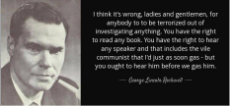
>>99481
>Would prefer anarcho-primitivism over ancap
>Second pic related
Anarchism was laughed at since its inception because it was created by proto-hippies who adopted the tenets of Marxism. Anarcho-capitalism did not develop from this line but is the logical conclusion of libertarianism, which was founded from the Austrian tradition. Paleo-libertarianism, the branch of libertarianism prescribed by Hans-Hermann Hoppe and which contains the bulk of anarcho-capitalists, do not desire to turn society on its head like other anarchists but simply want to shunt authority from a monopoly (the State) to a network of institutions that must depend on voluntary support from society.
Anyway, most anarcho-capitalists are not "either-or" ideological purists. They simply see a total absence of government as the ideal but are willing to take any reduction in government that they get, and wouldn't mind living under a minarchist or "night watchman" state."
>>99479
Anarcho-syndicalism is simply a rebranded version of anarcho-communism that was practiced in Republican Spain (and failed spectacularly, as you might imagine). Any ideology that rejects tradition and hierarchy and pursues social justice "for workers" cannot be tolerated.
>>99486
I used to be a distributist and believed that capitalism and socialism were equally flawed, materialistic systems. A few years ago, after I took economics as a course I realized that capitalism does not "force" one to be materialistic and greedy, whereas socialism indeed does force one to be part of the system. Also, distributism cannot limit the size of businesses without a strong and overreaching government, which violates my libertarian principles. It also ignores the very real economic principle of "economies of scale," which provides that for certain goods a firm of a certain size is needed to reach maximum efficiency. Also, government regulations, which are much more difficult for small businesses than for large teams, have done much more to erase "mom-&-pop" stores than free-market capitalism.
>>99473
It's not bad, in that it's far superior to what we have now. However, as you might guess, I still think the State would have too large a role in private commerce. Anti-monopoly and anti-trust laws actually have an adverse effect (https://mises.org/library/do-antitrust-laws-preserve-competition) and, though I may hold the unpopular opinion here, free trade is important for a country. For example, if we blocked trade with the Orient, we would of course have to produce more t-shirts, toys, etc., but because of limited resources we would produce fewer microchips, airplanes, and guns. The prices of all these goods would rise, because of higher costs of production, and average wages would fall, because of the reduced worth of output. We would be objectively worse off.
>>99501
Precisely why we need an on-going dialogue in order to reach a favorable and mutually beneficial consensus. If one's opinion shifts in a day he's rather weak-minded.
>Would prefer anarcho-primitivism over ancap
>Second pic related
Anarchism was laughed at since its inception because it was created by proto-hippies who adopted the tenets of Marxism. Anarcho-capitalism did not develop from this line but is the logical conclusion of libertarianism, which was founded from the Austrian tradition. Paleo-libertarianism, the branch of libertarianism prescribed by Hans-Hermann Hoppe and which contains the bulk of anarcho-capitalists, do not desire to turn society on its head like other anarchists but simply want to shunt authority from a monopoly (the State) to a network of institutions that must depend on voluntary support from society.
Anyway, most anarcho-capitalists are not "either-or" ideological purists. They simply see a total absence of government as the ideal but are willing to take any reduction in government that they get, and wouldn't mind living under a minarchist or "night watchman" state."
>>99479
Anarcho-syndicalism is simply a rebranded version of anarcho-communism that was practiced in Republican Spain (and failed spectacularly, as you might imagine). Any ideology that rejects tradition and hierarchy and pursues social justice "for workers" cannot be tolerated.
>>99486
I used to be a distributist and believed that capitalism and socialism were equally flawed, materialistic systems. A few years ago, after I took economics as a course I realized that capitalism does not "force" one to be materialistic and greedy, whereas socialism indeed does force one to be part of the system. Also, distributism cannot limit the size of businesses without a strong and overreaching government, which violates my libertarian principles. It also ignores the very real economic principle of "economies of scale," which provides that for certain goods a firm of a certain size is needed to reach maximum efficiency. Also, government regulations, which are much more difficult for small businesses than for large teams, have done much more to erase "mom-&-pop" stores than free-market capitalism.
>>99473
It's not bad, in that it's far superior to what we have now. However, as you might guess, I still think the State would have too large a role in private commerce. Anti-monopoly and anti-trust laws actually have an adverse effect (https://mises.org/library/do-antitrust-laws-preserve-competition) and, though I may hold the unpopular opinion here, free trade is important for a country. For example, if we blocked trade with the Orient, we would of course have to produce more t-shirts, toys, etc., but because of limited resources we would produce fewer microchips, airplanes, and guns. The prices of all these goods would rise, because of higher costs of production, and average wages would fall, because of the reduced worth of output. We would be objectively worse off.
>>99501
Precisely why we need an on-going dialogue in order to reach a favorable and mutually beneficial consensus. If one's opinion shifts in a day he's rather weak-minded.
>>99501
Well, honestly I am conflicted about them too. I don't think that free market will really solve everthing but crony capitalism iws a problem.
There are certain sectors like education and healthcare where I thing selling out to companies won't do much good.
Sometimes I think they just hate taxes and it is just a reciprocal of what we have now.
But I believe in personal freedom.
I try to listen to arguments if they are based on logic and facts.
I don't try to get some conversation going because I think this is the thread that will save the world but understanding alternative viewpoints and extrapolating something as motivation and common ground is an interesting topic.
Well, honestly I am conflicted about them too. I don't think that free market will really solve everthing but crony capitalism iws a problem.
There are certain sectors like education and healthcare where I thing selling out to companies won't do much good.
Sometimes I think they just hate taxes and it is just a reciprocal of what we have now.
But I believe in personal freedom.
I try to listen to arguments if they are based on logic and facts.
I don't try to get some conversation going because I think this is the thread that will save the world but understanding alternative viewpoints and extrapolating something as motivation and common ground is an interesting topic.
>>99507
>I realized that capitalism does not "force" one to be materialistic and greedy
Here they teach that the highest priority is to maximize profits.
Economics are the only field left where the principle of total war still applies.
>I realized that capitalism does not "force" one to be materialistic and greedy
Here they teach that the highest priority is to maximize profits.
Economics are the only field left where the principle of total war still applies.
>>99513
As taught traditionally, yes. However, social responsibility is an increasing factor that applies to companies. Firms that fail to provide a positive impact to their communities are given lower priority by knowing consumers, if not criticized outright.
Also, maximizing profit and practicing "total war" may work short term but will damage you in the long run. EA has kept up its Jewish practices in the gaming sphere and has essentially zero credibility among that community: how long do you think they'll last if they release more flops and competition tightens? Conversely, Walt Disney pursued a policy of "making money to make movies" and, by setting the highest bar in animation, established the most valuable entertainment corporation in the world.
Also, not everyone wants to have the deepest pockets and the largest market share. People think that privatizing education and healthcare would lead to schooling only for business and McHospitals™ where cancer patients would be thrown out if they run out of dough. It's sad that those on the right would make the same error as socialists on the left and completely ignore the enormous impact religious organizations have had upon society.
As taught traditionally, yes. However, social responsibility is an increasing factor that applies to companies. Firms that fail to provide a positive impact to their communities are given lower priority by knowing consumers, if not criticized outright.
Also, maximizing profit and practicing "total war" may work short term but will damage you in the long run. EA has kept up its Jewish practices in the gaming sphere and has essentially zero credibility among that community: how long do you think they'll last if they release more flops and competition tightens? Conversely, Walt Disney pursued a policy of "making money to make movies" and, by setting the highest bar in animation, established the most valuable entertainment corporation in the world.
Also, not everyone wants to have the deepest pockets and the largest market share. People think that privatizing education and healthcare would lead to schooling only for business and McHospitals™ where cancer patients would be thrown out if they run out of dough. It's sad that those on the right would make the same error as socialists on the left and completely ignore the enormous impact religious organizations have had upon society.
>>99530
>McHospitals™ where cancer patients would be thrown out if they run out of dough
That is one of my major problems with this
How to keep the hippocratic oath in line with "selling" medical service
Docters sell useless shit because it brings money instead of doing what is best for the patient.
The economical worth of a human body parts surpasses the the productivity of the average human.
I get all the "blah blah NAP and humans have morals"-shit but I fear that there will be a heavy shift towards shekel and less doing what is right
Like the fucking meds that have too high cost to develop so $ is of higher worth than human life
I am not convinced that the "hacks won't endure in the market" holds up with reality
>McHospitals™ where cancer patients would be thrown out if they run out of dough
That is one of my major problems with this
How to keep the hippocratic oath in line with "selling" medical service
Docters sell useless shit because it brings money instead of doing what is best for the patient.
The economical worth of a human body parts surpasses the the productivity of the average human.
I get all the "blah blah NAP and humans have morals"-shit but I fear that there will be a heavy shift towards shekel and less doing what is right
Like the fucking meds that have too high cost to develop so $ is of higher worth than human life
I am not convinced that the "hacks won't endure in the market" holds up with reality
>>99530
I may despise humans but still this is messed up and if these things apply even in a subsidised society why should it be any different in a harsher ancap society?
I may despise humans but still this is messed up and if these things apply even in a subsidised society why should it be any different in a harsher ancap society?
>>99532
http://tomwoods.com/d/bernie.pdf
Chapter 7, Page 66 onwards
Generally speaking, the medicine is not what's expensive, what's expensive is the delivery of care and the insurance premiums. These are what are messed up and they are the most heavily regulated part of the market.
http://tomwoods.com/d/bernie.pdf
Chapter 7, Page 66 onwards
Generally speaking, the medicine is not what's expensive, what's expensive is the delivery of care and the insurance premiums. These are what are messed up and they are the most heavily regulated part of the market.
Interesting links: http://www.libertymachinenews.com/me-a-fascist.html
https://steemit.com/libertarianism/@jaredhowe/the-alt-right-are-the-real-libertarians
http://www.zerothposition.com/2017/11/17/libertarians-support-ethnic-nationalism/
I don't think that economics is the point of contention between libertarians and the alt-right. For a large portion of the alt-right (if not the majority), a free market is the ideal, if it is not already advocated to the fullest extent. For these people, Austrian economics offers a cogent solution to the scarcity of resources, one with numerous publications and no conclusive debunking by socialists and their allies. The relative few in the alt-right who are socialists, distributists or otherwise "third-way" proponents generally have not read the foundational works of Austrian theory or reject capitalism from a non-economic standpoint. This is not to say that further debate won't occur, but rather it takes second fiddle to the figurative elephant in the room.
This matter is one that reflects the entire alt-right and therefore demands careful situation: how to achieve a white ethnostate. The alt-right has several goals that apply to the bulk of its (vaguely defined) members, but one is completely consistent: we must secure an existence of our race and a future for white children. Although taboo to mention in conventional society, it is an imperative that must be fulfilled lest the entirety of the West crumble. There is no contest that it would benefit the social fabric of our people, and would incidentally benefit the other races as their talent and resources could be used to benefit themselves rather than be cast into a "melting pot."
Our opposition, disagreeing with our goals or disdaining the presence of race in politics, hurls against us rhetorical questions relating to a white ethnostate. Such questions include what qualifies as racial identity (which is easily answered on a scientific basis according to several similar standards) or whether exclusion of immigration is an intrusion on individual rights (it is not, as no one has a right to live wherever he pleases). This banter is irrelevant because it deals with policy after the establishment of a white ethnostate, which is a long way off.
There is one issue, however, which we must solve: how do we establish a white ethnostate? An ethnostate is a nation limited to a particular ethnicity, and thereby must exclude others. In order to do so requires a rearrangement of society on the national scale. The practical and ethical ramifications of this are enormous, and must be rectified soon and applied near-universally across the movement. The failure to do so may cause internal fractures, apparent moral weakness, and inherent unpopularity. We must pick a method to achieve an ethnostate through moral and practical considerations.
Let me list the potential methods available:
1) Secession: Members of society with a common goal (in this case: a white ethnostate) would collect in a province and secede from the national government in order to enact their ideals. This may end up fracturing the nation-state into smaller collectives if other races decide to establish their own ethnostates. Whites from across the country would be free to move to this ethnostate as a safe haven and this system allows the most room for individual rights. However, the weaknesses are glaring. The national government would not be eager to give up power and, with approval from the rest of society, may declare war on the fledgling nation. Bordering ethnostates of different race may declare war or launch border conflicts for territory or resources. It is not at all a satisfying solution for Europeans as it involves surrendering part of our ancestral homeland and it gives migrants a base from which to continue their jihad.
2) Social Pressure: Rather than impose legal sanctions, the white majority uses "soft power" tactics by celebrating its culture and promoting its agenda, thereby alienating other ethnic groups and non-coercively urging them to leave the country. This used to be the policy of most of the West prior to the influx of social Marxism. However, it works only over a long period. Additionally, with a sufficiently large minority presence it fails to push them out but rather squeezes them into ghettos and increases racial tension. Also, it fails to take into account the Political Pendulum which may reverse and form a culture that welcomes multiculturalism.
3) Soft Legal Pressure: The State starts to take an active role through non-forceful measures. These include tax breaks for white families with children, tax penalties/reduced legal recourse for minorities, and subsidies for minorities to emigrate. However, besides the encroach of State power there is a definite consequence: more enterprising minorities will take advantage of the subsidies to establish themselves in their homelands, but the true scum of the earth would not do this but stay behind.
4) Hard Legal Pressure: This includes much more stringent methods of limiting minority population, including forced deportation to their homeland, sequestration into a smaller ethnostate or outright sterilization. Although effective, there would be backlash from the international community as well as other uncertainties (what if the foreign homeland rejects them?). May result in revolt.
5) "The Final Solution": The scary "g-word." You know what it entails and should avoid it if at all possible (if you unironically think it's good you need your head checked). It's entirely internal, effective, and final but would have heavy backlash. It would probably cause a revolution and in the future your descendants might out of guilt start the problem again that led to it in the first place.
https://steemit.com/libertarianism/@jaredhowe/the-alt-right-are-the-real-libertarians
http://www.zerothposition.com/2017/11/17/libertarians-support-ethnic-nationalism/
I don't think that economics is the point of contention between libertarians and the alt-right. For a large portion of the alt-right (if not the majority), a free market is the ideal, if it is not already advocated to the fullest extent. For these people, Austrian economics offers a cogent solution to the scarcity of resources, one with numerous publications and no conclusive debunking by socialists and their allies. The relative few in the alt-right who are socialists, distributists or otherwise "third-way" proponents generally have not read the foundational works of Austrian theory or reject capitalism from a non-economic standpoint. This is not to say that further debate won't occur, but rather it takes second fiddle to the figurative elephant in the room.
This matter is one that reflects the entire alt-right and therefore demands careful situation: how to achieve a white ethnostate. The alt-right has several goals that apply to the bulk of its (vaguely defined) members, but one is completely consistent: we must secure an existence of our race and a future for white children. Although taboo to mention in conventional society, it is an imperative that must be fulfilled lest the entirety of the West crumble. There is no contest that it would benefit the social fabric of our people, and would incidentally benefit the other races as their talent and resources could be used to benefit themselves rather than be cast into a "melting pot."
Our opposition, disagreeing with our goals or disdaining the presence of race in politics, hurls against us rhetorical questions relating to a white ethnostate. Such questions include what qualifies as racial identity (which is easily answered on a scientific basis according to several similar standards) or whether exclusion of immigration is an intrusion on individual rights (it is not, as no one has a right to live wherever he pleases). This banter is irrelevant because it deals with policy after the establishment of a white ethnostate, which is a long way off.
There is one issue, however, which we must solve: how do we establish a white ethnostate? An ethnostate is a nation limited to a particular ethnicity, and thereby must exclude others. In order to do so requires a rearrangement of society on the national scale. The practical and ethical ramifications of this are enormous, and must be rectified soon and applied near-universally across the movement. The failure to do so may cause internal fractures, apparent moral weakness, and inherent unpopularity. We must pick a method to achieve an ethnostate through moral and practical considerations.
Let me list the potential methods available:
1) Secession: Members of society with a common goal (in this case: a white ethnostate) would collect in a province and secede from the national government in order to enact their ideals. This may end up fracturing the nation-state into smaller collectives if other races decide to establish their own ethnostates. Whites from across the country would be free to move to this ethnostate as a safe haven and this system allows the most room for individual rights. However, the weaknesses are glaring. The national government would not be eager to give up power and, with approval from the rest of society, may declare war on the fledgling nation. Bordering ethnostates of different race may declare war or launch border conflicts for territory or resources. It is not at all a satisfying solution for Europeans as it involves surrendering part of our ancestral homeland and it gives migrants a base from which to continue their jihad.
2) Social Pressure: Rather than impose legal sanctions, the white majority uses "soft power" tactics by celebrating its culture and promoting its agenda, thereby alienating other ethnic groups and non-coercively urging them to leave the country. This used to be the policy of most of the West prior to the influx of social Marxism. However, it works only over a long period. Additionally, with a sufficiently large minority presence it fails to push them out but rather squeezes them into ghettos and increases racial tension. Also, it fails to take into account the Political Pendulum which may reverse and form a culture that welcomes multiculturalism.
3) Soft Legal Pressure: The State starts to take an active role through non-forceful measures. These include tax breaks for white families with children, tax penalties/reduced legal recourse for minorities, and subsidies for minorities to emigrate. However, besides the encroach of State power there is a definite consequence: more enterprising minorities will take advantage of the subsidies to establish themselves in their homelands, but the true scum of the earth would not do this but stay behind.
4) Hard Legal Pressure: This includes much more stringent methods of limiting minority population, including forced deportation to their homeland, sequestration into a smaller ethnostate or outright sterilization. Although effective, there would be backlash from the international community as well as other uncertainties (what if the foreign homeland rejects them?). May result in revolt.
5) "The Final Solution": The scary "g-word." You know what it entails and should avoid it if at all possible (if you unironically think it's good you need your head checked). It's entirely internal, effective, and final but would have heavy backlash. It would probably cause a revolution and in the future your descendants might out of guilt start the problem again that led to it in the first place.
An Ethnic Consideration of America
I feel that the situation in Europe is much less complicated than the one in America. In Europe, it's easy to distinguish a non-European from a native and you would be well within your rights to deport the former. However, America has large minority populations and these have been around for generations. If you wish to establish a white ethnostate in America you first need to know the history and interests of the other groups in the country.
Blacks: brought as slaves from Africa hundreds of years ago, they have generally formed their own identity. Since the Liberia project they have generally congregated in inner cities around the country. Their IQ is a fully standard deviation above Sub-Saharan Africans but at least a standard deviation below that of whites. They comprise about 13% of the population but commit half the crime.
Hispanics: some have remained since the conquest of the modern south-west U.S. in 1848, but most are recent migrants from Mexico, Central America, and South America. Most remain in the southwestern U.S. to be close to their neighbors, but they are now everywhere. Getting close to 20% of the population and are the second most violent group.
Asians: a few are descendants of the coolies who worked on the railroads, but most are relatively recent immigrants. They live in large cities and are particularly concentrated in California. About 5% of the population, they have the second-highest IQ (after Jews) and perform exceptionally well academically.
Pacific Islanders: Concentrated in their homelands and Hawaii. Are somewhat poor and are small enough to be statistically irrelevant. Are not at all violent.
American Indians: America is technically their homeland although they didn't farm all that much. They are still salty about dying to whites a lot and tend to be alcoholics. Their reservations are their ethnostates.
Arabs: Will claim to be peaceful despite belonging to a religion which is far from it. They then spread this religion which will be second-largest in America by 2050 if nothing is done about it.
Jews: Generally distinguish themselves between Orthodox and Reformed. Orthodox love Israel and Reformed/atheist love Marxism. Those who actually break from this are called "self-hating Jewish Nazis" and are statistically irrelevant. Orthodox are easy to distinguish because they breed amongst themselves; Reformed less so as they are physically mostly similar to whites. Generally have the highest IQ and are overrepresented in everything that has influence.
This makes me mad. The Libertarian Party™ has long been cucked by SJWs, but this really goes past the line. The vice-chair of the Party, who looks like he's from Designated Streetistan, just went and posted that statement in the pic. All the right-libertarians are up in arms over it, as they should be, and hopefully this redpills more people as to how degenerate the lolberts are. We need to stock up more Zyklon-B for them.
Interestingly, he's from Maryland. I have a suspicion he might be part of Pizzagate.
Interestingly, he's from Maryland. I have a suspicion he might be part of Pizzagate.
>>106051
The US "Libertarian" Party has been taken over by what HHH calls "lalalibertarians" and I refer to as "Kochitarians." (https://radicalcapitalist.org/2017/12/26/rothbard-vs-the-koch-libertarians-cato-institute/) These are basically liberal globalists pretending to be libertarians. Organizations that endorse this false branch of libertarianism include Cato, Reason, the FEE, and the Libertarian Party. Real, Rothbardian libertarianism is more present at places like the Lew Rockwell website, the Mises Institute, the Property and Freedom Society, and people like Tom Woods. In my opinion, true libertarians should support the Constitution Party, who aside from their willingness to use government coercion to prevent certain social degeneracies rather than ethically preferable social pressure, align near perfectly with libertarian values.
https://www.constitutionparty.com/principles/seven-principles/
The US "Libertarian" Party has been taken over by what HHH calls "lalalibertarians" and I refer to as "Kochitarians." (https://radicalcapitalist.org/2017/12/26/rothbard-vs-the-koch-libertarians-cato-institute/) These are basically liberal globalists pretending to be libertarians. Organizations that endorse this false branch of libertarianism include Cato, Reason, the FEE, and the Libertarian Party. Real, Rothbardian libertarianism is more present at places like the Lew Rockwell website, the Mises Institute, the Property and Freedom Society, and people like Tom Woods. In my opinion, true libertarians should support the Constitution Party, who aside from their willingness to use government coercion to prevent certain social degeneracies rather than ethically preferable social pressure, align near perfectly with libertarian values.
https://www.constitutionparty.com/principles/seven-principles/
>>105538
By the way, don't forget about this. It's important.
Also, I found this quite interesting: People claim that ethno-nationalism is implicitly authoritarian but it really is not. https://www.youtube.com/watch?v=hQUwQU_Qf-I
Also, very important article for all of us: http://therevolutionaryconservative.com/blog/bridging-the-civic-and-ehtnic-nationalist-divide/
By the way, don't forget about this. It's important.
Also, I found this quite interesting: People claim that ethno-nationalism is implicitly authoritarian but it really is not. https://www.youtube.com/watch?v=hQUwQU_Qf-I
Also, very important article for all of us: http://therevolutionaryconservative.com/blog/bridging-the-civic-and-ehtnic-nationalist-divide/
>>99048
>The Future of the Alt-Right
Speaking of this, I hope all of you realize that if you don't have (white) children, you are all talk and no action.
"Western family values." Live them. Have (white) children, or they win.
>The Future of the Alt-Right
Speaking of this, I hope all of you realize that if you don't have (white) children, you are all talk and no action.
"Western family values." Live them. Have (white) children, or they win.
>>99051
> 1) We must secure the existence of our race and a future for white children.
So, we should add to "Practices":
1. HAVE WHITE CHILDREN
This is the most important thing.
> 1) We must secure the existence of our race and a future for white children.
So, we should add to "Practices":
1. HAVE WHITE CHILDREN
This is the most important thing.
>>106898
Precisely. Over the next few years I plan to find a wholesome Aryan lady who is willing to support the 14 words. Not easy when you live in an Asian country. Most Western women expats live for either money or pleasure.
>>106904
As a personal practice, yes. You cannot really enact it as a law though, unless if you gave subsidies to white families only.
>>106827
Europe is quite simplistic if not easy. Outsiders have been there for only a few generations at most and so it's easy to identify them and toss them all back to where they came (except for Big Man Tyrone, I think he can stay).
America is complicated, though. Blacks no longer hail from a particular place in Africa and, through combination with other slave descendants and some interbreeding with whites, have a distinctly new culture that is not really compatible with any particular African country. Therefore, unless if we go to the trouble of seizing a plot of land on the Dark Continent "sending them back" is not an option. It ceased to be viable after Abraham Lincoln was assassinated and his plan died with him (he still was a tyrant who launched a war that killed hundreds of thousands of white Americans).
Obviously the current situation is unsatisfactory. Personally, I feel the best solution for the Blacks is to give them their own ethnostate in America, as Malcolm X envisioned. However, unless if we cordoned off the inner-city ghettos as ethnostates (which would cause mass starvation unless if we continued sending aid), the process of forming such an ethno-state would violate the rights of property-holding whites. We lose either way.
It's less complicated for the other ethnic groups. Hispanics have their own ethno-states and, if they really don't want to go back, we could give them southern California (it's not good for much anyway). American Indians have their own ethno-states already and an independent or territory of Hawaii would be an ethno-state for the Pacific Islanders.
I'm bringing this up because we seriously do need discussion on this. You bring up an ethno-state to a normie and they'll say "so you want to kill off the minorities?" It's bad for optics and is divisive in the movement, because different alt-righters have different ideas for policy. We need a clear, distinct path for an ethno-state that the entire alt-right can rally behind and which, even if still unpalatable to normies, uses the minimal level of force.
Precisely. Over the next few years I plan to find a wholesome Aryan lady who is willing to support the 14 words. Not easy when you live in an Asian country. Most Western women expats live for either money or pleasure.
>>106904
As a personal practice, yes. You cannot really enact it as a law though, unless if you gave subsidies to white families only.
>>106827
Europe is quite simplistic if not easy. Outsiders have been there for only a few generations at most and so it's easy to identify them and toss them all back to where they came (except for Big Man Tyrone, I think he can stay).
America is complicated, though. Blacks no longer hail from a particular place in Africa and, through combination with other slave descendants and some interbreeding with whites, have a distinctly new culture that is not really compatible with any particular African country. Therefore, unless if we go to the trouble of seizing a plot of land on the Dark Continent "sending them back" is not an option. It ceased to be viable after Abraham Lincoln was assassinated and his plan died with him (he still was a tyrant who launched a war that killed hundreds of thousands of white Americans).
Obviously the current situation is unsatisfactory. Personally, I feel the best solution for the Blacks is to give them their own ethnostate in America, as Malcolm X envisioned. However, unless if we cordoned off the inner-city ghettos as ethnostates (which would cause mass starvation unless if we continued sending aid), the process of forming such an ethno-state would violate the rights of property-holding whites. We lose either way.
It's less complicated for the other ethnic groups. Hispanics have their own ethno-states and, if they really don't want to go back, we could give them southern California (it's not good for much anyway). American Indians have their own ethno-states already and an independent or territory of Hawaii would be an ethno-state for the Pacific Islanders.
I'm bringing this up because we seriously do need discussion on this. You bring up an ethno-state to a normie and they'll say "so you want to kill off the minorities?" It's bad for optics and is divisive in the movement, because different alt-righters have different ideas for policy. We need a clear, distinct path for an ethno-state that the entire alt-right can rally behind and which, even if still unpalatable to normies, uses the minimal level of force.
forced ethic states/communities is stupid, just as pidgeonholing people based on ethnicity is stupid. It is a violation of freedom of association and anyone who thinks this shit is a good idea is just as bad as the leftist fucks.
>>106968
I'm inclined to agree with you; however, forced integration and multiculturalism are much worse. We need to find a way to stop and repair the damage to our civilization.
I'm inclined to agree with you; however, forced integration and multiculturalism are much worse. We need to find a way to stop and repair the damage to our civilization.
>>107051
I believe if you get rid of anti-discrimination laws, get rid od the welfare, close the borders, and end the state protected monopolization of media and entertainment by a few corporations who invariably argue for multicultural globalism, most people will naturally stay with a group they identify with.
I believe if you get rid of anti-discrimination laws, get rid od the welfare, close the borders, and end the state protected monopolization of media and entertainment by a few corporations who invariably argue for multicultural globalism, most people will naturally stay with a group they identify with.
>>99051
I'm up late for no good reason, so its time to actually sit down and digest this thread now. I am libertarian in thinking, but tbh fam the 'Libertarian Party' is a fucking joke.
>1) We must secure the existence of our race and a future for white children.
I would imagine the vast majority of libertarians don't give this even a though, as race isn't really of any concern to us. I feel like people who are deeply concerned about race have never been outside, or in a culturally diverse area. Once you meet enough people, you soon realize that there are niggers in every race.
>2) We must reduce the reach of the State to the minimum possible extent, if not abolish it completely.
No disagreement, though I'm a minarchist myself.
>3) We must promote traditional faith, morals, and family, and denounce degeneracy.
Seeing that these things are subjective, as long as one does not violate the rights of someone else in pursuit of these things, then there is no issue.
>4) We must end all burdensome regulations and economic constraints on free enterprise, and adopt a policy of unrestricted free trade.
okhand.jpg
>5) We must guard our borders and deport all illegal aliens.
Yes.
>6) We must guard the rights of individuals, including their own rights to defend themselves and their communities.
Without question.
>7) We must privatize all national socialized systems, including education and healthcare, and abolish social spending in welfare and social security.
Yes. All of these can and have been privatized in the past with great success.
>8) We must end ties with all foreign supranational organizations and abolish all federal foreign aid (including and especially to Israel).
I certainly would pick Israel over any of the other middle eastern shitholes, but they should stand on their own feet.
>9) We must bar the entrance of adherents of incompatible ideologies and limit the immigration of foreigners.
Honestly I feel this is a huge area of contention among libertarians. You have one camp which more or less supports open borders, and the other that supports limiting and/or restricting migration. This is probably one of the primary areas of contention between libertarians and alt-right folks. Can you really claim to want freedom while simultaneously promoting a 'Papers, please' culture?
>10) We must end all federal anti-discriminatory laws and affirmative action.
Of course.
>11) We must adopt a non-interventionist foreign policy and end our foreign conflicts.
Yep.
>12) We must end all dysgenic and so-called “eugenic” programs including state-funded contraception; this includes outlawing abortion.
I'll agree with ending state funded contraception. The abortion topic is probably another area of major conflict between libertarian and alt-right thinkers. Many libertarians are pro-choice but for stupid reasons. I am personally pro life, but am pro-choice in a societal perspective. Outlawing abortion will not end it, but rather make it a clandestine endeavor, not to mention doing so is a use of force via the government. Instead, promote pro life choices through morals and values. Educate and uplift people instead of using the government as a gun to the head.
>13) We must end the police state and its methods of domestic surveillance, terror, and suppression.
Remove the power of the state, and you'll see this disappear.
>14) We must end central banking and stop governmental interference in the markets.
obviously
>15) We must seek to decentralize power from the federal level to the regional level, from the regional level to the local level, and from the local level to the community level.
Yes.
Overall, there is a good amount of overlap between alt-right and libertarianism that I see. I still feel like the main difference is that of the role of the government, and cultural-racial relationships in society.
Whatever, its fucking 3am and I should sleep. pls no bully.
I'm up late for no good reason, so its time to actually sit down and digest this thread now. I am libertarian in thinking, but tbh fam the 'Libertarian Party' is a fucking joke.
>1) We must secure the existence of our race and a future for white children.
I would imagine the vast majority of libertarians don't give this even a though, as race isn't really of any concern to us. I feel like people who are deeply concerned about race have never been outside, or in a culturally diverse area. Once you meet enough people, you soon realize that there are niggers in every race.
>2) We must reduce the reach of the State to the minimum possible extent, if not abolish it completely.
No disagreement, though I'm a minarchist myself.
>3) We must promote traditional faith, morals, and family, and denounce degeneracy.
Seeing that these things are subjective, as long as one does not violate the rights of someone else in pursuit of these things, then there is no issue.
>4) We must end all burdensome regulations and economic constraints on free enterprise, and adopt a policy of unrestricted free trade.
okhand.jpg
>5) We must guard our borders and deport all illegal aliens.
Yes.
>6) We must guard the rights of individuals, including their own rights to defend themselves and their communities.
Without question.
>7) We must privatize all national socialized systems, including education and healthcare, and abolish social spending in welfare and social security.
Yes. All of these can and have been privatized in the past with great success.
>8) We must end ties with all foreign supranational organizations and abolish all federal foreign aid (including and especially to Israel).
I certainly would pick Israel over any of the other middle eastern shitholes, but they should stand on their own feet.
>9) We must bar the entrance of adherents of incompatible ideologies and limit the immigration of foreigners.
Honestly I feel this is a huge area of contention among libertarians. You have one camp which more or less supports open borders, and the other that supports limiting and/or restricting migration. This is probably one of the primary areas of contention between libertarians and alt-right folks. Can you really claim to want freedom while simultaneously promoting a 'Papers, please' culture?
>10) We must end all federal anti-discriminatory laws and affirmative action.
Of course.
>11) We must adopt a non-interventionist foreign policy and end our foreign conflicts.
Yep.
>12) We must end all dysgenic and so-called “eugenic” programs including state-funded contraception; this includes outlawing abortion.
I'll agree with ending state funded contraception. The abortion topic is probably another area of major conflict between libertarian and alt-right thinkers. Many libertarians are pro-choice but for stupid reasons. I am personally pro life, but am pro-choice in a societal perspective. Outlawing abortion will not end it, but rather make it a clandestine endeavor, not to mention doing so is a use of force via the government. Instead, promote pro life choices through morals and values. Educate and uplift people instead of using the government as a gun to the head.
>13) We must end the police state and its methods of domestic surveillance, terror, and suppression.
Remove the power of the state, and you'll see this disappear.
>14) We must end central banking and stop governmental interference in the markets.
obviously
>15) We must seek to decentralize power from the federal level to the regional level, from the regional level to the local level, and from the local level to the community level.
Yes.
Overall, there is a good amount of overlap between alt-right and libertarianism that I see. I still feel like the main difference is that of the role of the government, and cultural-racial relationships in society.
Whatever, its fucking 3am and I should sleep. pls no bully.
>>107160
>I would imagine the vast majority of libertarians don't give this even a though, as race isn't really of any concern to us. I feel like people who are deeply concerned about race have never been outside, or in a culturally diverse area. Once you meet enough people, you soon realize that there are niggers in every race.
This is very true, but it is a matter of proportions as well as cultural identity. Mark Twain said that traveling the world erases prejudice, but it has been the opposite for me. I previously had the impression that the Chinese were exceptionally polite, for instance, but this is only the case for relatives and people with whom they have a mutually beneficial relationship; otherwise, it's a mad-rush society.
Also, if libertarians are not concerned about race from a principled perspective (which there is nothing wrong with, as nothing about self-rule says you can't prefer people who are similar), they should be concerned from a practical perspective. The vast majority of libertarians are white, and if whites ever became a minority the principles of liberty would perish. Cultural dimensions as well as history have a part in it.
>Honestly I feel this is a huge area of contention among libertarians. You have one camp which more or less supports open borders, and the other that supports limiting and/or restricting migration. This is probably one of the primary areas of contention between libertarians and alt-right folks. Can you really claim to want freedom while simultaneously promoting a 'Papers, please' culture?
It's not so much a "Papers, please" culture as much as a recognition that as long as public property exists, making it readily available to a third-party is immoral. If taxation is theft, then letting immigrants have unrestricted access to the infrastructure supported by such taxes is equivalent to fencing of stolen goods. If/when a truly libertarian society is established, it would be a non-issue as the nation would consist of private property, and immigrants would either have to purchase land or be supported entirely by sponsors (which would limit immigration to only the most qualified). You can read more at: https://radicalcapitalist.org/2017/07/06/the-libertarian-case-against-open-borders/
>I would imagine the vast majority of libertarians don't give this even a though, as race isn't really of any concern to us. I feel like people who are deeply concerned about race have never been outside, or in a culturally diverse area. Once you meet enough people, you soon realize that there are niggers in every race.
This is very true, but it is a matter of proportions as well as cultural identity. Mark Twain said that traveling the world erases prejudice, but it has been the opposite for me. I previously had the impression that the Chinese were exceptionally polite, for instance, but this is only the case for relatives and people with whom they have a mutually beneficial relationship; otherwise, it's a mad-rush society.
Also, if libertarians are not concerned about race from a principled perspective (which there is nothing wrong with, as nothing about self-rule says you can't prefer people who are similar), they should be concerned from a practical perspective. The vast majority of libertarians are white, and if whites ever became a minority the principles of liberty would perish. Cultural dimensions as well as history have a part in it.
>Honestly I feel this is a huge area of contention among libertarians. You have one camp which more or less supports open borders, and the other that supports limiting and/or restricting migration. This is probably one of the primary areas of contention between libertarians and alt-right folks. Can you really claim to want freedom while simultaneously promoting a 'Papers, please' culture?
It's not so much a "Papers, please" culture as much as a recognition that as long as public property exists, making it readily available to a third-party is immoral. If taxation is theft, then letting immigrants have unrestricted access to the infrastructure supported by such taxes is equivalent to fencing of stolen goods. If/when a truly libertarian society is established, it would be a non-issue as the nation would consist of private property, and immigrants would either have to purchase land or be supported entirely by sponsors (which would limit immigration to only the most qualified). You can read more at: https://radicalcapitalist.org/2017/07/06/the-libertarian-case-against-open-borders/
>>108617
No, central banks are inherently illibertarian as they rely on government coercion to exist.
No, central banks are inherently illibertarian as they rely on government coercion to exist.
>>108617
(((Griffons))) are afraid of fair competition which would punish their greed. They always want as much government that they can get away with.
Yes, I'm bumping my own thread because I like a semi-permanent center of discussion for important matters
(((Griffons))) are afraid of fair competition which would punish their greed. They always want as much government that they can get away with.
1517306771.gif (543.2 KB, 320x176, E54FA831-2FEB-45E1-A51F-93DD609F6061.gif)

>>112242
You are literally a tripflag.
Please put on a tripcode so I can at least filter you.
This is supposed to be an anonymous community and since you are the only one with that flag, you are NOT anonymous. You are a tripflag, and a one-man cancer at that.
You are literally a tripflag.
Please put on a tripcode so I can at least filter you.
This is supposed to be an anonymous community and since you are the only one with that flag, you are NOT anonymous. You are a tripflag, and a one-man cancer at that.
>>112245
Congratz.
Congratz.
>>112253
Because of the sewage that follows. There exist intelligent, learned NatSocs; I've met them. But you are pic related and it hurts me that I have to see the words you haphazardly type.
Because of the sewage that follows. There exist intelligent, learned NatSocs; I've met them. But you are pic related and it hurts me that I have to see the words you haphazardly type.
>>112254
Whatever dude i don't really care about what your saying. But i do care about you coming here and disrespecting me when we gave you and the rest of your general refuge here.
Whatever dude i don't really care about what your saying. But i do care about you coming here and disrespecting me when we gave you and the rest of your general refuge here.
>>112256
For the record, I came here for the mlpol, not the anonfilly. I learned of this board from an Aryanne thread.
For the record, I came here for the mlpol, not the anonfilly. I learned of this board from an Aryanne thread.
1517700882.png (22.6 KB, 800x480, 800px-Flag_of_Liechtenstein.svg.png)
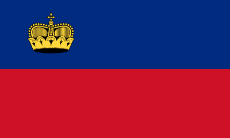
Is Liechtenstein the closest thing we have to a contemporary libertarian social order?
First, we shall get a privatized police force and then, COCA-COLA DEATH SQUADS!
http://www.dailymail.co.uk/news/article-5346699/First-private-police-force-caught-400-criminals.html
Across the pond, I needn't mention the levels of hypocrisy the "Libertarian" Party is on. They actually banned Ron Paul and Judge Napolitano from their convention! Of course, they then posted on the Book of Faces some mollifying slogan about defending free speech. When users started calling them out on this, they blocked all replies and likes on the page.
http://www.dailymail.co.uk/news/article-5346699/First-private-police-force-caught-400-criminals.html
Across the pond, I needn't mention the levels of hypocrisy the "Libertarian" Party is on. They actually banned Ron Paul and Judge Napolitano from their convention! Of course, they then posted on the Book of Faces some mollifying slogan about defending free speech. When users started calling them out on this, they blocked all replies and likes on the page.
>>114087
Aside from Liberland (which is blockaded) and the Seasteading Project (still in progress), I would say yes. It's limited to a relative handful of people unless if you can show big cash, though.
Aside from Liberland (which is blockaded) and the Seasteading Project (still in progress), I would say yes. It's limited to a relative handful of people unless if you can show big cash, though.
>>114292
That party is a disgrace. Sold its soul to the neoliberal Koch brothers. I'd say at this point the Constitution Party or the libertarian wing of the GOP (e.g. Rand Paul) is a better option.
That party is a disgrace. Sold its soul to the neoliberal Koch brothers. I'd say at this point the Constitution Party or the libertarian wing of the GOP (e.g. Rand Paul) is a better option.
https://www.lewrockwell.com/2018/02/murray-n-rothbard/egalitarianism-as-a-revolt-against-nature-and-other-essays/
Just read this great Rothbard article. You should all take a look.
Just read this great Rothbard article. You should all take a look.
>>115336
Read that a couple of years ago. I've always been a libertarian and disdained social justice types, but that essay redpilled me on egalitarianism and why it is inherently evil, thus pushing me onto a path that eventually led to the alt-right. Cannot recommend enough.
Read that a couple of years ago. I've always been a libertarian and disdained social justice types, but that essay redpilled me on egalitarianism and why it is inherently evil, thus pushing me onto a path that eventually led to the alt-right. Cannot recommend enough.
Bumping with brand new a e s t h e t i c. On that note, we need a new aesthetic thread, the old one died.
Read this article and steer any libertarian-leaning friends you have into reading it:
http://www.libertymachinenews.com/itrsquos-time-for-libertarian-fascism.html
http://www.libertymachinenews.com/itrsquos-time-for-libertarian-fascism.html
>>106941
I had a similar idea using the East coast (the original 13 colonies) as a black-nationalist ethnostate. The goal being to silence people calling for reparations, and also give blacks a way to leave without causing mass unrest. The only (((whites))) on the east coast are democrats, and if they get subjected to terrible things by the new government, they deserve it.
>>106945
Indeed it does.
I had a similar idea using the East coast (the original 13 colonies) as a black-nationalist ethnostate. The goal being to silence people calling for reparations, and also give blacks a way to leave without causing mass unrest. The only (((whites))) on the east coast are democrats, and if they get subjected to terrible things by the new government, they deserve it.
>>106945
Indeed it does.
>>112253
to me, it's a socialist symbol, and remains a socialist symbol. a foreign social justice ideology pushed to some extremes, always acclaimed as the only solution, the miracle cure to every problem of the society! but at the cost of our rights and freedoms, so here's why I'm a far right guy, but this, it's not far right. it's not even nationalism.
to me, it's a socialist symbol, and remains a socialist symbol. a foreign social justice ideology pushed to some extremes, always acclaimed as the only solution, the miracle cure to every problem of the society! but at the cost of our rights and freedoms, so here's why I'm a far right guy, but this, it's not far right. it's not even nationalism.
>>99051
I don't really like how you have got "Principles" and "Practices" but your practices are basically the same if you put "We must" in front of each sentence.
Practices should be what everyone reading this can do in their day to day life.
Principles should be more a list of ideals to work for, if you can vote for someone standing for these then do, if a someone wants to know what we stand for then here is a list (in other terms you can gain x amount of votes by promoting these policy's).
They can relate to one another but not the same thing for example I dislike fiat currency so promoting investment in gold & silver and cryptocurrency would be a practice since it is something I can do with my own money or just learning more about them and talking to others about them. Also educating all children on basic economics would be great not just for reducing our dependency on the USD & fiat but would help them as individuals stay out of debt and contribute to society more effectively.
(I know they mostly come from hans hermann hoppe but I hope to give you constructive criticism. And people would be more enthusiastic if they have more solid instructions rather than just abstract ideals)
Maybe you could draw something like a mindmap of what you want to achieve, the policy's required for this, how to enact these policy's, a day to day to do list and link how each node effects/promotes others.
I don't really like how you have got "Principles" and "Practices" but your practices are basically the same if you put "We must" in front of each sentence.
Practices should be what everyone reading this can do in their day to day life.
Principles should be more a list of ideals to work for, if you can vote for someone standing for these then do, if a someone wants to know what we stand for then here is a list (in other terms you can gain x amount of votes by promoting these policy's).
They can relate to one another but not the same thing for example I dislike fiat currency so promoting investment in gold & silver and cryptocurrency would be a practice since it is something I can do with my own money or just learning more about them and talking to others about them. Also educating all children on basic economics would be great not just for reducing our dependency on the USD & fiat but would help them as individuals stay out of debt and contribute to society more effectively.
(I know they mostly come from hans hermann hoppe but I hope to give you constructive criticism. And people would be more enthusiastic if they have more solid instructions rather than just abstract ideals)
Maybe you could draw something like a mindmap of what you want to achieve, the policy's required for this, how to enact these policy's, a day to day to do list and link how each node effects/promotes others.
>>99051
This could just be me reading too much into the word "all" but it seems like you are looking at the negative and suggesting to scrap everything despite the good it does, putting us in a worse position than when things were functioning badly. (I'm something like a minarchist not an ancap)
>7) We must privatize all national socialized systems, including education and healthcare, and abolish social spending in welfare and social security.
I'm all for complete privatization however these do provide a great benefit to society. Reducing their size, increasing privatization and reducing abuse would be much better than complete removal of many of these.
There is a big difference between giving a loan or tax break to small start up companies, helping people who are willing to work find it, keeping the homeless rates low compared to drug dealers pretending to be looking for work to get extra money, poping out more babies to get more government hand-outs, consuming and spending money rather than saving.
I think there should be base levels at which you receive government assistance however it should not be a very nice thing. For example if you can't support yourself, are homeless, have debt and refuse to find work etcetera the government will provide a small room and crappy factory job (and rehabilitation depending on the individuals needs) until you are able to support yourself. Something like the old workhouses.
Private education and home schooling should be promoted however free basic education should be available, I'd prefer if it was compulsory for fewer years, more flexible (take time off if needed) and a year or two of farm/army work or conscription to help children see the real world promote nationalism and leave their parents.
Even after reading things like Education: Free and Compulsory by Murray N. Rothbard I still believe it is an overall good, for example you can't believe that this child would be better off being educated only by her https://www.youtube.com/watch?v=OSs1nK3T6aU
>10) We must end all federal anti-discriminatory laws and affirmative action.
There is no problem with anti-discrimination laws, affirmative action however should be scrapped.
I think almost everyone from communists to an-caps want to live in a world that is a fair and meritocratic system where the best person gets the job, gets paid (and gets to keep) what their work is worth.
(The dividing lines are deciding what each person's work is worth, communists tend to view managers and business owners the way libertarians view government taxes; A does the work and B gets paid.)
Anti-discrimination laws should just make sure that the best person for the job gets the job. If a black or a Mexican can do the job better than I can, good for them if a Jewish person is not as good as me then I get the job not them. Unless there is some reason like a Chinese restaurant hiring Asians only.
Affirmative action is not meritocratic and any law that promotes affirmative action should be changed.
>12) We must end all dysgenic and so-called “eugenic” programs including state-funded contraception; this includes outlawing abortion.
To be honest I'm all for eugenics, ideally with the government being as non-interventionist as possible (something like liberal eugenics). Outlawing abortion I do not have a problem with, however promoting contraception in low IQ populations seems like a good idea.
All systems will have some type of eugenics there will always be some genes that are better adapted to an environment than others, for every policy and law a country has it will inevitably benefit some and harm others, if the country has welfare then it could be that people who are more prone to accepting it will have more children, over time this will cause a change in the population. Of cause policies such as welfare and conscription will dramatically affect which groups produce more children but even the most innocuous laws will make changes in the demographics long term.
If we will always be preforming eugenics programs it is not immoral to have eugenics polices but immoral to have bad ones. We owe it to the next generation to give them the best life possible. In the same way drinking and drugs during pregnancy is seen as child abuse because it is bad to give children disabilities and low IQ it must be a good thing to remove disabilities and give them a higher IQ.
Only the method in which the eugenics is carried out is immoral. Clearly holocausts are not the most ethical method but also not most pragmatic method.
We know that IQ is one of the biggest determining factors in wealth in later life and under a libertarian/ancap system money will be extremely important.
If we were to give children intelligence tests throughout childhood then explain to them that they have a lower than average IQ and they will likely struggle in life, having children of their own will be a big burden and they will most likely enjoy their life more if they get sterilized and they can still adopt later in life if they marry someone of the opposite sex. Of course not everyone will agree to it but even just a few will make a big impact on the whole after many years since only one partner would need to be sterilized in a relationship low IQ people currently have the majority of children and people tend to have relationships with people close to their own intelligence level
By sterilizing people with the less desirable traits rather than killing them you do not lose your work force, less of a sudden impact and also provide better child care due to less unwanted children and more caring people wanting to adopt.
Makes me think of this
cheekyvideos.net/murdoch/Nice%20Guy%20National%20Socialist.html
This could just be me reading too much into the word "all" but it seems like you are looking at the negative and suggesting to scrap everything despite the good it does, putting us in a worse position than when things were functioning badly. (I'm something like a minarchist not an ancap)
>7) We must privatize all national socialized systems, including education and healthcare, and abolish social spending in welfare and social security.
I'm all for complete privatization however these do provide a great benefit to society. Reducing their size, increasing privatization and reducing abuse would be much better than complete removal of many of these.
There is a big difference between giving a loan or tax break to small start up companies, helping people who are willing to work find it, keeping the homeless rates low compared to drug dealers pretending to be looking for work to get extra money, poping out more babies to get more government hand-outs, consuming and spending money rather than saving.
I think there should be base levels at which you receive government assistance however it should not be a very nice thing. For example if you can't support yourself, are homeless, have debt and refuse to find work etcetera the government will provide a small room and crappy factory job (and rehabilitation depending on the individuals needs) until you are able to support yourself. Something like the old workhouses.
Private education and home schooling should be promoted however free basic education should be available, I'd prefer if it was compulsory for fewer years, more flexible (take time off if needed) and a year or two of farm/army work or conscription to help children see the real world promote nationalism and leave their parents.
Even after reading things like Education: Free and Compulsory by Murray N. Rothbard I still believe it is an overall good, for example you can't believe that this child would be better off being educated only by her https://www.youtube.com/watch?v=OSs1nK3T6aU
>10) We must end all federal anti-discriminatory laws and affirmative action.
There is no problem with anti-discrimination laws, affirmative action however should be scrapped.
I think almost everyone from communists to an-caps want to live in a world that is a fair and meritocratic system where the best person gets the job, gets paid (and gets to keep) what their work is worth.
(The dividing lines are deciding what each person's work is worth, communists tend to view managers and business owners the way libertarians view government taxes; A does the work and B gets paid.)
Anti-discrimination laws should just make sure that the best person for the job gets the job. If a black or a Mexican can do the job better than I can, good for them if a Jewish person is not as good as me then I get the job not them. Unless there is some reason like a Chinese restaurant hiring Asians only.
Affirmative action is not meritocratic and any law that promotes affirmative action should be changed.
>12) We must end all dysgenic and so-called “eugenic” programs including state-funded contraception; this includes outlawing abortion.
To be honest I'm all for eugenics, ideally with the government being as non-interventionist as possible (something like liberal eugenics). Outlawing abortion I do not have a problem with, however promoting contraception in low IQ populations seems like a good idea.
All systems will have some type of eugenics there will always be some genes that are better adapted to an environment than others, for every policy and law a country has it will inevitably benefit some and harm others, if the country has welfare then it could be that people who are more prone to accepting it will have more children, over time this will cause a change in the population. Of cause policies such as welfare and conscription will dramatically affect which groups produce more children but even the most innocuous laws will make changes in the demographics long term.
If we will always be preforming eugenics programs it is not immoral to have eugenics polices but immoral to have bad ones. We owe it to the next generation to give them the best life possible. In the same way drinking and drugs during pregnancy is seen as child abuse because it is bad to give children disabilities and low IQ it must be a good thing to remove disabilities and give them a higher IQ.
Only the method in which the eugenics is carried out is immoral. Clearly holocausts are not the most ethical method but also not most pragmatic method.
We know that IQ is one of the biggest determining factors in wealth in later life and under a libertarian/ancap system money will be extremely important.
If we were to give children intelligence tests throughout childhood then explain to them that they have a lower than average IQ and they will likely struggle in life, having children of their own will be a big burden and they will most likely enjoy their life more if they get sterilized and they can still adopt later in life if they marry someone of the opposite sex. Of course not everyone will agree to it but even just a few will make a big impact on the whole after many years since only one partner would need to be sterilized in a relationship low IQ people currently have the majority of children and people tend to have relationships with people close to their own intelligence level
By sterilizing people with the less desirable traits rather than killing them you do not lose your work force, less of a sudden impact and also provide better child care due to less unwanted children and more caring people wanting to adopt.
Makes me think of this
cheekyvideos.net/murdoch/Nice%20Guy%20National%20Socialist.html
1521609817.jpg (112.1 KB, 937x718, AryanneAndLeslieFaireArguing.jpg)
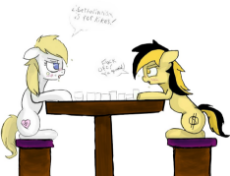
Bump because this is a better place to argue about libertarianism versus authoritarianism than the other threads that spring up everywhere.
>>121041
This article doesn't understand libertarian philosophy at all. It goes on and on how it wants the protect the individual, but it bars certain individuals based on their heritage. The vast inequalities presented by statistics do not apply to each individual, and should not be used as tools to murder a vast amount of people.
The population problem for white men can be resolved without the need of wiping out entire populations of people.
1. Get a grip on the current immigration problem. Slow legal immigration to a dribble.
2. Protect the borders.
3. Fix the gynocentric courts, and the current institution of marriage.
This article doesn't understand libertarian philosophy at all. It goes on and on how it wants the protect the individual, but it bars certain individuals based on their heritage. The vast inequalities presented by statistics do not apply to each individual, and should not be used as tools to murder a vast amount of people.
The population problem for white men can be resolved without the need of wiping out entire populations of people.
1. Get a grip on the current immigration problem. Slow legal immigration to a dribble.
2. Protect the borders.
3. Fix the gynocentric courts, and the current institution of marriage.
>>136015
Not him, but no. 4 is enforce tje damn laws. All because you are a Mexican or a Muslim doesn't mean you can get away with breaking the law.
Not him, but no. 4 is enforce tje damn laws. All because you are a Mexican or a Muslim doesn't mean you can get away with breaking the law.
>>136015
How do you go about shooting them? I hope you give them due process before placing a bullet in their skull. Is shooting them really the best option before us?
Crimanal can be used for various forms of labor, and can still contribute to society while they serve their time.
The problem is some people in todays prisons have either been falsely accused, or are in prison for things that shouldn't be crimes in the first place!
>>136016
>enforce the laws
Which laws though? I'm assuming you're talking about laws regarding murder, illegal immigration, rape, and theft.
The problem with the current legal system again is that a lot of the laws that are on the books right now are a convulouted mess brought about stuffy bureaucrats.
We need to fix the laws by getting rid of excess fat of useless, and over restrictive laws.
How do you go about shooting them? I hope you give them due process before placing a bullet in their skull. Is shooting them really the best option before us?
Crimanal can be used for various forms of labor, and can still contribute to society while they serve their time.
The problem is some people in todays prisons have either been falsely accused, or are in prison for things that shouldn't be crimes in the first place!
>>136016
>enforce the laws
Which laws though? I'm assuming you're talking about laws regarding murder, illegal immigration, rape, and theft.
The problem with the current legal system again is that a lot of the laws that are on the books right now are a convulouted mess brought about stuffy bureaucrats.
We need to fix the laws by getting rid of excess fat of useless, and over restrictive laws.
>>99304
I honestly thought the right never fights it’s self. Then I met No Bullshit and proves me that there are people I despise regardless we agree with the same polotics.
I honestly thought the right never fights it’s self. Then I met No Bullshit and proves me that there are people I despise regardless we agree with the same polotics.
>>136360
It would probably be slid off the board by "How can white boys even compete" and "D.RUMPF BTFO" posts.
It would probably be slid off the board by "How can white boys even compete" and "D.RUMPF BTFO" posts.
What symbols could we use that can attract widespread interest outside the United States? The dollar sign is the worst possible symbol for us tbh.
>>140705
I honestly agree. If I'd designed Leslie, I'd probably make her cutie mark a gun. The Gadsden flag is a good libertarian symbol, but I can't think of many others.
I honestly agree. If I'd designed Leslie, I'd probably make her cutie mark a gun. The Gadsden flag is a good libertarian symbol, but I can't think of many others.
Truediltom, a somewhat obscure Youtuber, discusses libertarianism and the alt-right intellectually and quite well. I recommend visiting his channel, whether you are libertarian or not, for his broad and balanced knowledge.
Some key videos:
Metamodernist culture: https://www.youtube.com/watch?v=aNFcGo0NSkg
Has Spencer abandoned the Alt-Right? https://www.youtube.com/watch?v=DXtdlAdzWgs
Sargon's arguments against the Alt-Right: https://www.youtube.com/watch?v=YrxkPq0bUv4
Response to Jeffery Tucker's "Five Differences Between the Alt-Right and Libertarianism": https://www.youtube.com/watch?v=92Yy3YtBuDs
Also, I finally gave Hoppe's "A Short History of Man" a good listen. The sociobiological basis of civilization is well-laid out and explains why society organized the way it did.
www.youtube.com/watch?v=C4x5GPbZwTI
Some key videos:
Metamodernist culture: https://www.youtube.com/watch?v=aNFcGo0NSkg
Has Spencer abandoned the Alt-Right? https://www.youtube.com/watch?v=DXtdlAdzWgs
Sargon's arguments against the Alt-Right: https://www.youtube.com/watch?v=YrxkPq0bUv4
Response to Jeffery Tucker's "Five Differences Between the Alt-Right and Libertarianism": https://www.youtube.com/watch?v=92Yy3YtBuDs
Also, I finally gave Hoppe's "A Short History of Man" a good listen. The sociobiological basis of civilization is well-laid out and explains why society organized the way it did.
www.youtube.com/watch?v=C4x5GPbZwTI
119 replies | 46 files | 44 UUIDs | Archived

